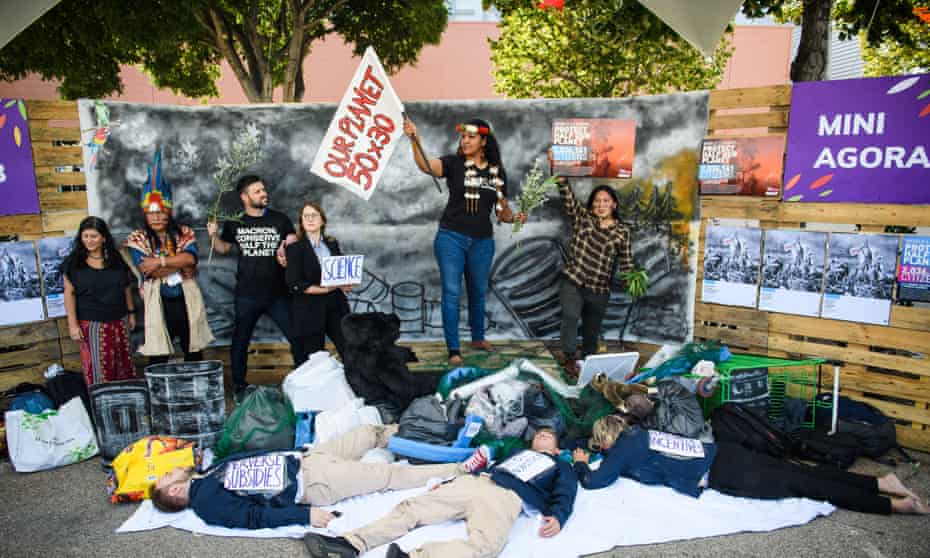An actor, two big bees and a lot of experts: a week spent tackling the planet’s problems
World’s largest conservation summit since Covid-19 brought 4,000 people to Marseille to showcase issues and solutions from coral reefs to land protection

Last modified on Sat 11 Sep 2021 06.01 EDT
At times in Marseille’s early autumn sun, pre-pandemic life felt tantalisingly close at the world’s largest conservation gathering since Covid began. Scientists presented the latest research on nature – in-person – to colleagues they had not seen for months or even years.
Amid the excitement of 4,000 people meeting face to face at the IUCN’s world conservation congress in the French port city, with more participating online, there was broad agreement that conservation is experiencing a moment of opportunity, despite obvious challenges, and that essential work has not stopped under lockdowns.
From sharks to Hainan gibbons, coral reefs to rivers, myriad projects were presented. Kenya revealed its first wildlife census, which counted 30 animal species and covered nearly 60% of its landmass; Costa Rica highlighted its #stopanimalselfies campaign. There were talks and debates on the universal declaration of the rights of the river, alien species, human-wildlife conflict, the use of Smart technology in conservation, genetic engineering and much more.
The actor Harrison Ford was an unlikely voice to lead the call for direction and unity at the start of the summit. After a lengthy speech from the French president, Emmanuel Macron, the 79-year-old Star Wars star and environmentalist urged those attending the congress to demand justice for mother nature.
“We all know the last few years have not been easy. It’s hard. It’s hard to devote yourself to a cause that is so urgent and not be able to get the traction to get the change that is absolutely necessary,” he said. “We are ambitious for perfect solutions, perfect policies. Nobody’s got that luxury any more. We’ve got to get to work. We’ve got to make things happen. We’ve got to make it happen now.”

Despite dire warnings about the planet’s health and the world’s failure to meet a single UN target to halt the destruction of nature, there were whispers that the pandemic has created a moment where action is possible.
“What happens in the next eight years is so critical,” said Costa Rica’s environment minister, Andrea Meza. “We only have this window of opportunity and it’s narrowing. If we don’t accelerate, we will lose our chance.”
How the world should change remains up for debate. Meza, alongside ministers in the UK and France, is leading a push to protect 30% of land and sea by the end of the decade in a UN agreement due to be negotiated in Kunming, China, next year, a goal that was was formally endorsed at the congress. She believes it is the best candidate for a simple, unifying slogan that will focus international action and attract much-needed finance for conservation.
But the 30% target is controversial. Indigenous communities fear it could legitimise land grabs and human rights violations, prompting hours of discussion about rights-based conservation at the congress. As Jennifer Morris, chief executive of The Nature Conservancy, acknowledged: “It can’t just be traditional protected areas. It has to include indigenous people, with indigenous people at the table.” Motions to protect 80% of the Amazon and support the rights of indigenous people were adopted.
Others are concerned the 30×30 slogan could distract from the need for urgent change to agriculture, invasive species management, pollution and resource extraction across the planet.

Carlos Manuel Rodriguez, Meza’s predecessor, who oversees a multibillion-dollar trust fund that provides climate and nature finance to help developing countries meet UN agreements, called for more inspiring leaders to step up. “We need rockstars,” he said. Rodriguez does not think the 30% target is ambitious enough. He would like countries to dedicate 1% of their GDP to halt and reverse the decline in biodiversity.
“Many developing countries believe that the financial burden should be on the northern industrialised countries,” Rodriguez says. “The developed world should stop the double agenda of conservation and sustainability while their companies are logging and mining. And they need to pay. Otherwise, in 10 years, all those people living in the south will be in the north.”
During the congress it was clear the old problems in conservation have not gone away and new ones have emerged in the pandemic. Forest fires and drought are intensifying as the climate warms. Data gaps mean we have little idea of the extent of human-caused destruction of the natural world. Ecotourism revenue has largely vanished and budgets have been slashed for environment ministries.

For Remy Rioux, chief executive of the French development agency, who helped lead talks on the Paris climate agreement, attention needs to be paid to repurposing existing finance streams alongside making new commitments. “We estimate that for one US dollar of subsidy that is positive for nature, you have eight that are detrimental,” he said. “In the Paris agreement, we wrote down three objectives: mitigation, adaptation and finance. The transformation of the financial sector is an end in itself. It has to be the same for nature.”
During the congress, financiers, ministers and government officials ensured the return of ambitious pledges and environmental jargon, with “nature-based solutions”, “one health” and “natural capital” all prominent buzz phrases.
Meanwhile, the IUCN presented updates to its red list of threatened species, with the komodo dragon, sharks and rays and wild crop relatives on the decline but tuna species doing better. Delegates voted in Razan al-Mubarak, head of Abu Dhabi’s environment agency, as the new president and a series of motions was passed, including one calling for a ban on deep-sea mining.

There was also a return of the absurd in the themed areas across nine halls in the shadow of the Stade Velodrome: an activist dressed as a rat quietly watching a policy discussion on French conservation; a couple dressed as bees relaying the importance of the pollinators.
Ford said a generation of young environmentalists would soon lead the changes, helping to correct the failures of previous generations.
“Reinforcements are on the way,” he told the congress. “They’re sitting in lecture halls now, venturing into the field for the very first time, writing their theses, they’re leading marches, organising communities, learning to turn passion into progress and potential into power. But they’re not here yet. In a few years, they will be here.”
In the meantime, many of those gathered in Marseille will be looking to Cop26 in Glasgow in November, where conservationists will be paying particular attention to the impact of the climate emergency on nature and the crucial role of biodiversity in the planet’s health.
Find more age of extinction coverage here, and follow biodiversity reporters Phoebe Weston and Patrick Greenfield on Twitter for all the latest news and features
